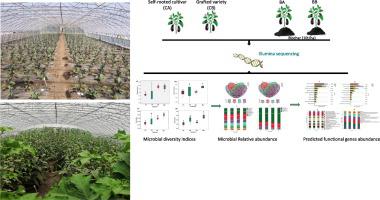Applied Soil Ecology ( IF 4.8 ) Pub Date : 2021-02-02 , DOI: 10.1016/j.apsoil.2021.103912 Abiola O. Ogundeji , Ying Li , Xiangjun Liu , Lingbo Meng , Ping Sang , Yao Mu , Haolei Wu , Zenang Ma , Jian Hou , Shumin Li

|
The suppressiveness of soils to inhibit pathogens mostly require rich microbiome harbouring plant growth-promoting microbes in the soil, especially rhizosphere. The present study evaluates the suppressiveness of the rhizosphere of a grafted eggplant under biochar amendment and its effects on the microbial communities involved. This study used four treatments consisting of grafted (CB) and self-rooted (CA) eggplants, with 10 t/ha biochar addition each (as BB and BA). Results revealed that BB significantly suppressed the incidence of Verticillium wilt by more than 70% and improved the yield of eggplant compared with the control. Treatment of CB and BB showed significant effects on the community structure and abundance of bacteria and fungi. The bacteria diversity and richness of CB and BB were higher than those of the BA and CA, respectively. For bacteria, the analysis showed the genus Bacillus to be abundant in the rhizosphere of both CB and BB, while genera Humicola, Chaetomium, Mortierella, and Tausonia were the dominant fungi, suggesting they may play an active part in disease suppression. Based on Phylogenetic Investigation of Communities by Reconstruction of Unobserved States (PICRUSt) analysis, the results showed that CB and BB harbored more genes responsible for disease resistance than CA and BA. In summary, grafting with the addition of biochar was effective in suppressing Verticillium wilt of eggplant and can be given as a recommendation to eggplant growers to alleviate Verticillium wilt.
中文翻译:

通过生物炭嫁接增强茄子,可以吸收特定的微生物来抑制黄萎病
土壤对病原体的抑制作用主要需要富含微生物的土壤,而土壤中尤其是根际土壤中含有促进植物生长的微生物。本研究评估了生物炭改良下嫁接茄子根际的抑制作用及其对所涉及微生物群落的影响。这项研究使用了包括嫁接(CB)和自生根(CA)茄子的四种处理方法,每种处理均添加了10吨/公顷的生物炭(如BB和BA)。结果显示,与对照相比,BB显着抑制了黄萎病的发生率达70%以上,并提高了茄子的产量。对CB和BB的处理对细菌和真菌的群落结构和丰富度显示出显着影响。CB和BB的细菌多样性和丰富度分别高于BA和CA。芽孢杆菌在CB和BB的根际中都丰富,而Humicola属,Chaetomium属,Mortierella属和Tausonia属是优势菌,表明它们可能在抑制疾病中发挥积极作用。根据未观察到的国家重建的系统发育研究(PICRUSt)分析,结果表明CB和BB具有比CA和BA更多的抗病基因。总之,嫁接生物炭可有效抑制茄子黄萎病,可作为茄子种植者减轻黄萎病的推荐。



























 京公网安备 11010802027423号
京公网安备 11010802027423号